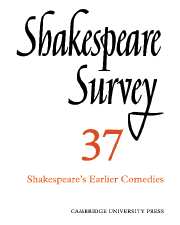Book contents
- Frontmatter
- Criticism of the Comedies up to The Merchant of Venice: 1953–82
- Plotting the Early Comedies: The Comedy of Errors, Love’s Labour’s Lost, The Two Gentlemen of Verona
- The Good Marriage of Katherine and Petruchio
- Shrewd and Kindly Farce
- Illustrations to A Midsummer Night’s Dream before 1920
- The Nature of Portia’s Victory: Turning to Men in The Merchant of Venice
- Nature’s Originals: Value in Shakespearian Pastoral
- 'Contrarieties agree': An Aspect of Dramatic Technique in Henry VI
- Falstaff’s Broken Voice
- ‘He who the sword of heaven will bear’: The Duke versus Angelo in Measure for Measure
- War and Sex in All’s Well That Ends Well
- Changing Places in Othello
- Prospero’s Lime Tree and the Pursuit of Vanitas
- Shakespearian Character Study to 1800
- How German is Shakespeare in Germany? Recent Trends in Criticism and Performance in West Germany
- Shakespeare Performances in Stratford upon–Avon–and London, 1982–3
- The Year's Contributions to Shakespearian Study 1 Critical Studies
- 2 Shakespeare’s Life, Times and Stage
- 3 Editions and Textual Studies
- Index
2 - Shakespeare’s Life, Times and Stage
Published online by Cambridge University Press: 28 March 2007
- Frontmatter
- Criticism of the Comedies up to The Merchant of Venice: 1953–82
- Plotting the Early Comedies: The Comedy of Errors, Love’s Labour’s Lost, The Two Gentlemen of Verona
- The Good Marriage of Katherine and Petruchio
- Shrewd and Kindly Farce
- Illustrations to A Midsummer Night’s Dream before 1920
- The Nature of Portia’s Victory: Turning to Men in The Merchant of Venice
- Nature’s Originals: Value in Shakespearian Pastoral
- 'Contrarieties agree': An Aspect of Dramatic Technique in Henry VI
- Falstaff’s Broken Voice
- ‘He who the sword of heaven will bear’: The Duke versus Angelo in Measure for Measure
- War and Sex in All’s Well That Ends Well
- Changing Places in Othello
- Prospero’s Lime Tree and the Pursuit of Vanitas
- Shakespearian Character Study to 1800
- How German is Shakespeare in Germany? Recent Trends in Criticism and Performance in West Germany
- Shakespeare Performances in Stratford upon–Avon–and London, 1982–3
- The Year's Contributions to Shakespearian Study 1 Critical Studies
- 2 Shakespeare’s Life, Times and Stage
- 3 Editions and Textual Studies
- Index
Summary
This Stage-Play World, by Julia Briggs (Oxford University Press, 1983), embodies in its title most of the themes which have dominated this year’s work. Shakespeare’s ‘Stage’ has swallowed up his ‘Life’ and ‘Times’; writers vie with one another to show that life was (and is) theatrical, that politics and theatre are inseparable, and that the visual side of the theatre - its architecture, its staging, its iconography - was after all as important as the words that were spoken there. I shall consider some of the reasons for this emphasis later, but first I shall look at some general works, starting with the one I just mentioned.
Julia Briggs’s excellent book is thematically structured, with examples from literary works illustrating chapters on Renaissance politics, religion, society, and so on. Though the theatre gets a chapter to itself, drama is shown to be interwoven with every aspect of the period: it provides an analogy for the Platonic view of life as a shadow, as well as for the formal and ceremonial nature of society, and it allows the expression, if not necessarily the resolution, of ‘passionately conflicting convictions’.
- Type
- Chapter
- Information
- Shakespeare Survey , pp. 188 - 202Publisher: Cambridge University PressPrint publication year: 1984

